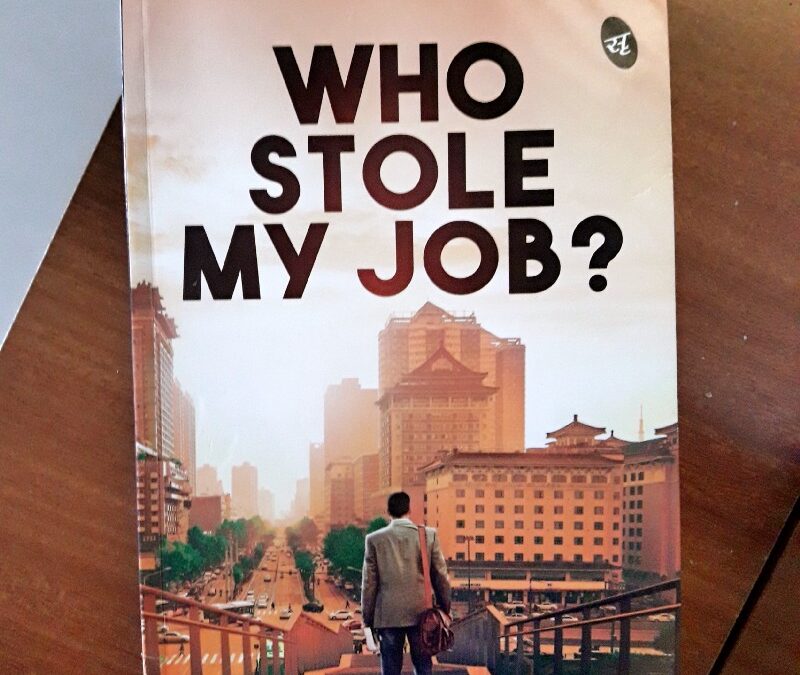Who Stole My Job — by Sunil Mishra
Publisher: Srishti Publishers & Distributors
Pages: 192
Price: Rs. 195 INR(Paperback), Rs. 152 INR(Kindle Edition)
ISBN: 978– 9387022577
Buy here: https://amzn.to/2YfrI24
Creative Tech has been one of the most successful IT companies in India during the last two decades. Only that it has started faltering of late. In a challenging and tumultuous business set-up, Marshal Scott, a newly hired American CEO, embarks on a transformation journey that starts on a high note, but soon gets entangled with many unexpected issues.
The employees experience disenchantment with the demanding leadership, frequent policy changes and cultural conflicts. Satvik, a mid-level manager sees the direct implications of these changes that lead to multiple business disruptions and exits of many of his colleagues.
Will things ever be same the again? Can Creative Tech tide over the disruption wave and reclaim its glorious past? What does employment mean for individuals and the corporate in the new digital world? Will the future of work be different from what was perfected after the Industrial Revolution?
About the author:
Sunil is a software professional with over two decades of experience in the field of banking technology. Currently, he is working with Infosys in India in the area of digital technologies and start-up ecosystem. He has earlier worked with McKinsey, Accenture and I-flex solutions. Sunil’s previous book Transit Lounge was a travel memoir of thirty countries. Sunil is an MBA from IIM-Lucknow and holds a B.Tech from IIT (ISM), Dhanbad.
My take on the book:
Satvik is a mid level manager and has been working for over a decade with Creative Tech. Creative Tech has been struggling on the revenue front for a while which forces their management to bring in a new CEO Marshal, however the catch being Marshal is based out of the US while Creative Tech operates out of India.
The initial days after Marshal takes over the reign sound exciting for the employees, shareholders and media as he announces multiple changes to existing policies, vision for a digital transformation of the org and hence their clients, some impressive sops for employees. However, in an attempt to bring quick turnaround, Marshal implements ideas that are rampant in US like sudden firing of senior employees, setting unrealistic growth targets and to some extent manipulating the revenue figures with false numbers.
Out of growing impatience to deliver his promises, Marshal further fumbles on strategy front, losing trust of employees, shareholders and media who once hailed him as a wonder. How this affects Satwik’s life, career and his outlook towards profession and what holds for the future of Marshal and Creative Tech forms the rest of the story.
The author takes up a realistic and fresh theme and weaves a story around the transformation journey a company undertakes with a new CEO. The variation in point of view of Satwik and his colleague Ajesh is brought out well all through the book, which depicts the two extremes and different opinions individuals can have over the same topic. Satwik’s interactions with his boss and mentor Vikas are equally interesting. The subtle message of how life in corporate world can look dreamy from outside but the reality can be totally different is brought out well.
However, the book is strictly for people working in the IT sector or those aspiring to work there in future. A lot of jargon, details mentioned by author especially after Marshal takes charge can be boring and non-relevant for people from other sectors. While the author sticks honestly to the theme and story, that can be major disappointment for those who expect drama. If corporate life and inside stories interest you, then this is a must read.
My rating:
4/5.

abhijit
I like the review. It has captured the essence of the book. Coming from a similar corporate background, not exactly and IT sector, I can relate to the turmoil in the organisation. Change is difficult and can often be tumultuous. Old leaving, those not leaving are seething, new try to find feet, junior employees have no clue whom to follow. CEOs from abroad, many of Indian origin, try to enforce system with unrealistic goals and expectation. Many have failed. Enjoyed reading the review.
Srishti RajeevMenda
The author’s background caught my eye… IIM and IIT. Corporate stories are always an interesting read. Team work, power play and much more on the cards. Will read the book.